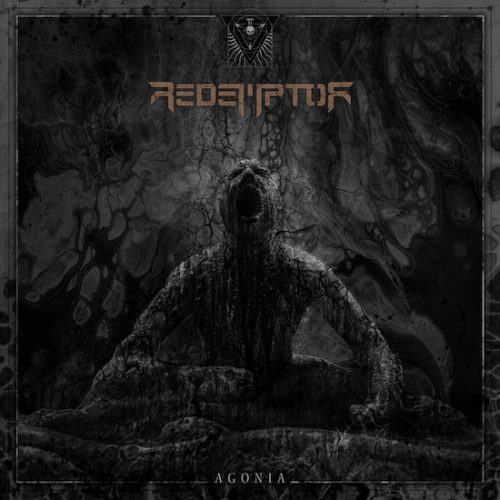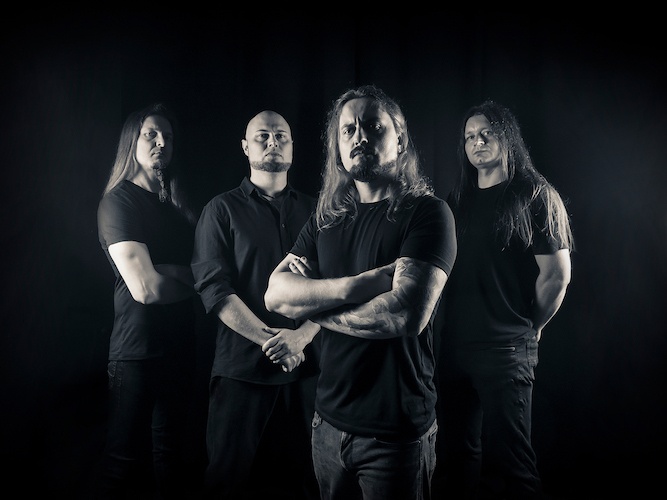
(Andy Synn has a long history with Redemptor, so we knew he was the only man for the job when it came to writing about their new album, Agonia, which comes out Friday on SelfMadeGod Records)
I love Death Metal. And, if you’re reading this, there’s a good chance you do too.
But, as someone who loves Death Metal I do find myself wondering sometimes… where is the genre going?
Let’s face it, there’s only so far, and so fast, that the more “Technical” and/or “Brutal” strains can push things before giving themselves whiplash, crippling arthritis, or an aneurysm, and only so many times that the corpse of “Old School” Death Metal can be dug up for yet another revival before it starts to smell, well, a little off.
What I’m really looking for, then, what I’m hoping for, is a new generation to step up and refine/define a form of Death Metal that’s actually new – call it “Post-Death Metal”, if you’re so inclined – rather than simply presenting something that’s just a flashier or more “extreme” variant of what we already know.
We’re not quite there yet – not as far as I can tell anyway – but it seems to me that there’s several bands already moving in this direction, capturing both the vibe and atmosphere of the genre without precisely fitting in with any one particular sub-style, and Redemptor are clearly right at the forefront of this movement, if the evidence presented on Agonia has anything to say about it.

Of course, even if the idea of “Post-Death Metal” – and I know that’s a contentious term for some people – is relatively new, its roots most definitely aren’t, and can easily be traced back to artists/albums such as Organic Hallucinosis-era Decapitated, From Mars… period Gojira, and post-Destroyers Ulcerate, all of which, it just so happens, seem to have served as major inspirations for Redemptor over the years.
And yet it’s also obvious that the Polish band are more than just the mere sum of their parts, or their influences. They’re something else, something more… or at least becoming something more… entirely.
Take opener Tectonic Plates, for example.
While the genetic fingerprints of all three of the aforementioned bands are plain to see – some more so than others, naturally – the arrangement of the track itself, the lengthy, brooding intro giving way to a thunderous metallic mid-section, only to dissolve once again into gloomy, simmering ambience, is, if not uniquely unusual, at least notably atypical, and points towards the band already chafing against the shackles of standard Death Metal songwriting.
Similarly “Potion of the Skies” augments its deathly heft with some serious atmospheric sensibilities, as well as some moody melodic elements reminiscent of sadly-disbanded NCS favourites In-Quest (another band whose music occasionally erred more towards the “Post-Death Metal” side of things), while “Tar” adopts/adapts a more extreme form of Gojira’s biomechanical barrage into something that can clearly trace its ancestry back to Morbid Angel’s seminal sound, yet also expands its sonic blueprint at the same time.
I suppose this is the key idea, the key observation, to make while working your way through Agonia. It’s not so much that the band have abandoned the traditional elements of Death Metal – far from it, in fact – but that they’ve focussed even more on how, and why, these various elements interlink and intertwine, finding the space between them and letting the layers of distortion, melody, and atmosphere breathe a little bit more.
It’s still dense as a dying star, make no mistake, but there’s an impression of volume – in more than just a physical sense – underlying each of these tracks, especially slower and/or more atmospherically-inclined numbers like “Further From Ordeal” and “Wounds Unhealed”, whose more spacious songwriting (and, lest I forget to mention it, impressively immersive and organic production) never once threatens to detract from the electrifying intensity of the music.
Of course, if you just want to enjoy this album as a piece of darkly oppressive Death Metal then no-one is going to stop you – the explosive mid-section of “Excursus Ignis”, for example, is as punishing as anything else you’re likely to hear this year, even if it is only a singular piece of the wider tapestry – but it seems to me that Agonia deserves to be appreciated as something much more ambitious than that (especially during stunning closer “Les Ruines De Pompei”, whose unconventional structure and expansive scope truly does deliver the unique vibe and voice the band have been cultivating across the entire album), from a band who clearly wear their influences, and their origins, with pride, but whose eyes and ambitions are set firmly on the future.
But, then again, maybe I’m wrong. Maybe this entire movement – if that’s even the right word for such a loose collection of albums and artists – will simply burn out and, ultimately, come to nothing. But I hope that’s not the case. I hope it keeps building, keeps growing, and keeps on pushing the genre forwards. And I hope that Redemptor continue to be one of the bands leading the way.

I’m a creature of imperfection. When I heard Potion of the Skies last month, I had–then and there–decided that this bum was going to be the contender to beat for my personal AOTY. I know. Bias is shitty. But what can I say. I like what I like, and I like this, and this is great.
Ha, I know what you mean. But *sometimes* you just get a feeling about an artist/album the first time you hear something from them.